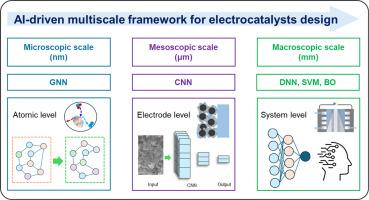人工智能在水电解电催化剂设计中的机遇与前景
IF 9.6
Q1 COMPUTER SCIENCE, ARTIFICIAL INTELLIGENCE
引用次数: 0
摘要
作为绿色制氢的关键途径,水电解有望在未来的能源格局中发挥核心作用。然而,它的大规模部署受到成本、性能和耐用性等挑战的阻碍。人工智能(AI)的出现为电催化剂的设计和优化提供了强大而有效的工具,从而改变了这一领域。本文概述了人工智能驱动的多尺度设计框架,强调了其在微观尺度上用于识别原子水平的活性位点和关键描述符,在中观尺度上用于结构和形态表征,以及在宏观尺度上用于多目标优化和智能控制的作用。这种多尺度框架展示了人工智能加速下一代电催化剂开发的潜力。此外,生成式人工智能和自动化实验技术的集成被强调为进一步加强电催化剂的发现和促进水电解技术的实际实施的有前途的策略。本文章由计算机程序翻译,如有差异,请以英文原文为准。

Opportunities and perspectives of artificial intelligence in electrocatalysts design for water electrolysis
As a key pathway for green hydrogen production, water electrolysis is expected to play a central role in the future energy landscape. However, its large-scale deployment is hindered by challenges related to cost, performance, and durability. The emergence of artificial intelligence (AI) has transformed this field by offering powerful and efficient tools for the design and optimization of electrocatalysts. This review outlines an AI-driven multiscale design framework, highlighting its role at the microscopic scale for identifying atomic-level active sites and key descriptors, at the mesoscopic scale for structural and morphological characterization, and at the macroscopic scale for multi-objective optimization and intelligent control. This multiscale framework demonstrates the potential of AI to accelerate the development of next-generation electrocatalysts. In addition, the integration of generative AI and automated experimental techniques is highlighted as promising strategies to further enhance electrocatalyst discovery and promote the practical implementation of water electrolysis technologies.
求助全文
通过发布文献求助,成功后即可免费获取论文全文。
去求助
来源期刊

Energy and AI
Engineering-Engineering (miscellaneous)
CiteScore
16.50
自引率
0.00%
发文量
64
审稿时长
56 days
 求助内容:
求助内容: 应助结果提醒方式:
应助结果提醒方式:


